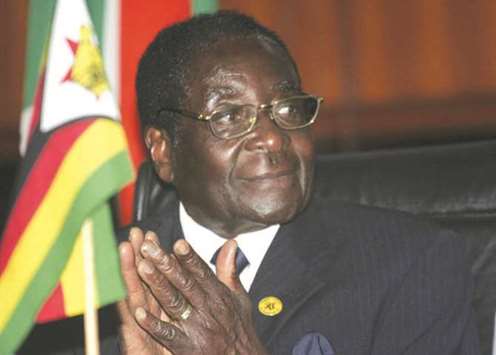The World Health Organisation (WHO) should overturn its decision to appoint Zimbabwean President Robert Mugabe as a goodwill ambassador, global health leaders said yesterday, describing the move as unjustifiable and wrong.
Britain said Mugabe’s appointment was “surprising and disappointing” and added that it risked overshadowing the WHO’s global work.
The United States, which has imposed sanctions on Mugabe for alleged human rights violations, said it was “disappointed”.
“This appointment clearly contradicts the United Nations’ ideals of respect for human rights and human dignity,” a US State Department spokesperson said. “This selection underscores why the United States continues to push for UN reform and leadership actions that uphold our shared UN ideals.”
WHO Director General Tedros Adhanom Ghebreyesus announced the appointment at a high-level meeting on non-communicable diseases (NCDs) in Uruguay on Wednesday.
The meeting was attended by Mugabe, 93.
He is blamed in the West for destroying his country’s economy and numerous human rights abuses during his 37 years leading the country as either president or prime minister.
In a speech, Tedros praised Zimbabwe as “a country that places universal health coverage and health promotion at the centre of its policies to provide health care to all”.
The former Ethiopian health and foreign minister, who was elected last May as WHO’s first African director general, added: “Today I am also honoured to announce that President Mugabe has agreed to serve as a goodwill ambassador on NCDs for Africa to influence his peers in his region to prioritise NCDs.”
However, the NCD Alliance, which represents 28 international health groups seeking to combat chronic diseases, said it was “shocked and deeply concerned” to hear of the appointment, given Mugabe’s “long track record of human rights violations”.
Jeremy Farrar, a leading global health specialist and director of the Wellcome Trust charity, also said that the decision was “deeply disappointing and wrong” and called on Tedros to be brave and reverse it.
“Robert Mugabe fails in every way to represent the values WHO should stand for and those that Dr Tedros has stood for since becoming DG and has done over many years,” Farrar said. “Brave leaders are willing to listen, rethink and overturn bad decisions, this is one such case.”
WHO spokesman Christian Lindmeier said the WHO chief had made the move seeking broad support for the agency’s work.
“Tedros has frequently talked of his determination to build a global movement to promote high-level political leadership for health,” he said by e-mail.
“Zimbabwe has ratified the WHO FCTC (Framework Convention on Tobacco Control) in 2014 and the government has launched a levy fund for NCDs to generate revenues for health promotion, including NCD prevention and control,” he added.
Human rights activists also criticised the move.
Hillel Neuer, executive director of the Geneva-based group UN Watch described the choice by WHO, a United Nations agency, as “sickening”.
“The government of Robert Mugabe has brutalised human rights activists, crushed democracy dissidents, and turned the breadbasket of Africa – and its health system – into a basket-case,” he said.
He noted that Mugabe himself had travelled to Singapore for medical treatment three times this year.
Iain Levine, deputy executive director for programmes at Human Rights Watch, said on Twitter: “Given Mugabe’s appalling human rights record, calling him a goodwill ambassador for anything embarrasses the WHO and Dr Tedros.”
Zimbabwean activist and human rights lawyer Doug Coltart said on Twitter that a “man who flies to Singapore for treatment because he has destroyed Zimbabwe’s health sector is WHO’s goodwill ambassador”.
Mugabe is in increasingly fragile health and makes regular trips abroad for medical treatment.
Contacted by AFP in Geneva, the WHO’s communications department said it was unable to comment further or respond to widening concerns about Mugabe’s role.
UN agencies often name high profile personalities as goodwill ambassadors to draw attention to their work, including actress Angelina Jolie with the refugee agency UNHCR.

Mugabe: travelled to Singapore for medical treatment three times this year rather than in his homeland.
